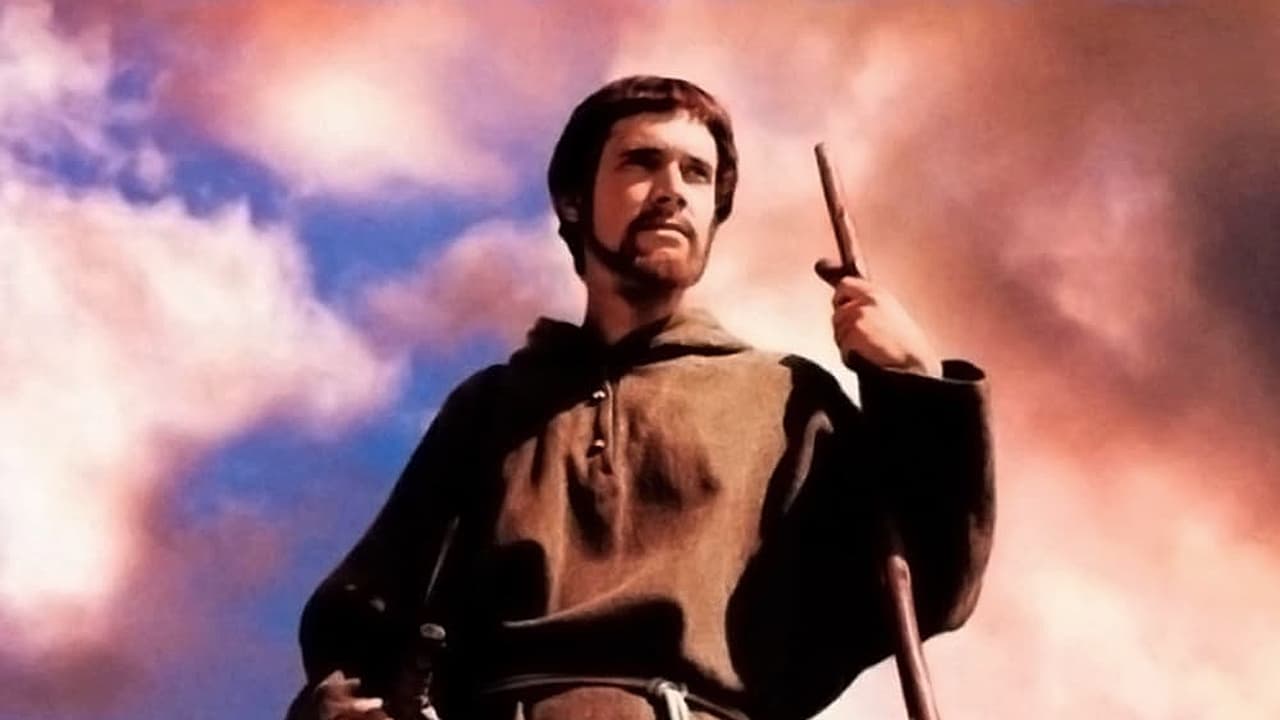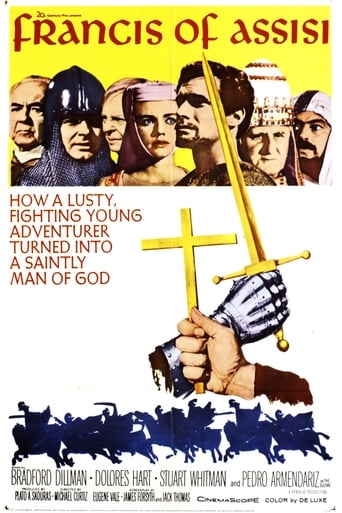



ridiculous rating
n my opinion it was a great movie with some interesting elements, even though having some plot holes and the ending probably was just too messy and crammed together, but still fun to watch and not your casual movie that is similar to all other ones.
View MoreThe acting is good, and the firecracker script has some excellent ideas.
View MoreIt is interesting even when nothing much happens, which is for most of its 3-hour running time. Read full review
View MoreI saw Francis of Assisi at the age of 11, when it came out in 1961 at the old Stanley Warner Beverly Hills theatre. The film was given the red carpet treatment and a bunch of us Catholics went to see it.Unhappily this film is nowhere near as good a biopic of a saint as, say, "Song of Bernadette" is. Zefferelli certainly had a lot more fun with Francis in "Brother Sun, Sister Moon." The film is one of those "international all star casts", 2nd rate epics popular the late 1950s-early '60s made by European production companies but released Stateside by one of the name studios, Fox in this case. The American actors either unknown at the time (Dillman)or of lesser rank status (Hart, Whitman) were shipped to the Continent to make European films more acceptable to US audiences. The rest of the cast was mostly unfamiliar to US filmgoers then, unless they caught British imports at the more offbeat theatres in town.Michael Curtiz, so effective at Warners with "Captain Blood," "Adv of Robin Hood," "Yankee Doodle Dandy," and "Casablanca" among so many other classics, drops the ball here. He must have been tired by this time, having directed movies for some 40 years. The actors are given by-the-book direction. A few scenes remind one of how great a film Curtiz had been able to make in the 1930s-40s.Bradford Dillman does his best with what he's given but the screenplay, closely following Louis de Wohl's novel, "The Joyful Beggar," comes across pretty unexcitingly. The film is more outline than biography, going from one episode to another, interested in the standard (fictional)romantic triangle, as s sop to attract Protestants, one surmises, and never gets down to really giving a dynamic cinematic portrait of Francis. De Wohl wrote a long series of novelized saints' biographies in the 1950s that were popular among Catholics of the era. He died rather unexpectedly in 1961. They are of a type, sometimes a touch titillating, but in the end quite inoffensive. They were deemed fine reading for Catholic youth in the 1950s; they are still good for children to introduce them to the saints. Just as an aside, it's fun to know that De Wohl was employed by the US military in WWII to write pseudo-Nostradamus quatrains denigrating Hitler, dropped by Allied planes over Germany to offset Hitler's claims that Nostradamus had predicted Der Fuhrer's success.Pedro Armendariz has a great role as the Sultan, and is the most believable actor in this show altho Dolores Hart is very affecting as Clare, especially at her leave-taking of Francis at the film's conclusion. The scene in which Francis ministers to Moslem prisoners after a Crusader victory is Dillman's most effective, Francis being exposed to the brutality of war, shuddering at the horrors committed by Christians in the name of Christ.Francis was revered even in his own time as "Father Francis" by his friars even tho he was only ordained a deacon. "Father" is a title given founders of religious orders by their spiritual "children" even today. The title has nothing to do with ordination. Indeed, Francis did not want to be ordained at all but Pope Innocent explained that, to be allowed to preach in church, a man had to be ordained at least a deacon. Only then did Francis accept the formality so he could preach in churches. On the other hand Francis was an administrative failure. This is why Brother Elias, his successor as Master General of the order is shown to be - accurately - pretty coldblooded in doing his job. Brother Juniper, always muddling up things in the "Flowers of St Francis" had a simplicity that was beloved by Francis. another reason for Juniper to be in the movie - there was a popular daily 1-panel daily newspaper cartoon at mid-20th century detailing a present-day Franciscan "Brother Juniper" getting into comic situations. This was a simpler time when few citizens gave a 2nd thought to seeing a Catholic friar as a cartoon character. Today the Leftists wd surely be crying foul. How dare Catholics be funny where they can see it! Finley Curry as a (Scottish???) Innocent III is much too old. And I doubt that popes, even then, conducted daily affairs dressed in Mass vestments and wearing the tiara, just to let everyone know who was pope. Cecil Kellaway plays Cardinal Ugolino, the sponsor and "protector" of the Franciscans. He wd later become Pope Gregory IX and spar with St Clare who fought him to a standstill, winning the right for her and the Franciscan nuns to keep Francis' demand that his followers own nothing.Sorry to say, the imposition of the Stigmata is one of the lamest special effects in film. It does nothing to convey the utter spirituality of the event, and Mario Nascimbene's score leaves a lot to be desired. He did a lot better in other foreign films but he was nowhere near Korngold or Steiner in backing up Curtiz' direction as they had at Warners 25 years earlier."Francis of Assisi" is an inoffensive 1950s wannabe epic, almost a precursor of those "sword and sandal" movies made in Italy that were to follow during the early '60s - the "Son of Hercules" films and others. This one could have been - and should have been - a lot better.
View MoreFrancis of Assisi is the usual, late fifties production. It's presented in 'scope, which is very nice. And it's shot on location in Italy, which is also nice. But we continually jump between location exteriors to tight quasi-exteriors and interiors with the unnaturally even, stage-bound lighting of the time. And the tone is hopelessly square, to meet the mindless, conformist hordes of the '50s without asking anything of them. 1961 is a great place to start marking the collapse of the Hollywood studio and star systems. Here an unlikely second banana (Bradford Dillman) is forced on viewers as a very poor leading man. If you ever wonder why unknowns are not asked to helm epics, Dillman is your answer.I can accept that a saint's behavior might seem artificial, but the whole cast here is so cardboard it's like watching robots. And a convention in which morally good people are distinguishable by their continual, vacant smiles indicates the shallowness of the film. Can life possibly be this flat for anyone? It's bursting with phony good cheer and "official story" blandness. With enunciation replacing acting. None of the leads even attempts an accent, y'know, because a saint in Italy is pretty much indistinguishable from Joe Sixpack in Indiana. ...storybook costumes, blonde fair-skinned 'Italian' maidens? Blecch. It's the embodiment of shabby, unworldly 1961 values, that would soon be left behind. Jack Warner must have had this movie in mind when he concocted his disastrous production of Camelot.
View MoreContrary to scant reviews of this movie as rather mediocre, several interesting aspects make it worth a viewing. Perhaps aside, there is the amazing parallel of movie-to-reality of lovely Dolores Hart, who plays the noble woman Clare. Clare forsook marriage to an earnest noble (Stuart Whitman) and followed Francis (Bradford Dillman), founding the Poor Clares order of nuns. Hart was on the verge of marriage in 1963, when she decided to become a nun. The acting is good enough to keep one interested. And seeing some of the last appearances of old guard like Finlay Currie, Cecil Kellaway, and irascible director Michael Curtiz (who directed many of Errol Flynn's swashbuckler movies and other Warner Bros. fare in Hollywood hey days) sufficiently tempts the serious movie buff. The movie itself has the looklots of color but also the lingering epic Hollywood scale--of historical yarns of the late 40s on through the 50s. Like the better efforts of this genre, the life of Francis progresses with a competent scriptparticularly in Francis's struggles against the establishment church. Thus it is historically preferable to Zeffirelli's minimalist Brother Sun, Sister Moon which frames Francis and Clare as more akin to 60s hippies than inhabitants of the 13th centurywith a plot that meanders like a music videoand Donovan's music to prove it (Zeffirelli also wanted the Beatles to appear in the movie!). This reviewer is perhaps tainted with some nostalgic bias, since as a small boy I saw the Southern California premiere of Francis of Assisi (in Downeysoutheast LA county suburb--of all places!) that included a live appearance and short commentary on stage by Stuart Whitman, who in his rough out style played Francis's friend-turned-antagonist (having been jilted by Clare) Count Paolo of Vandria. Years later at Universal I worked with Whitman, who, crusty as ever, recalled memories of the movie shoot as a tolerably pleasant experience.
View MoreThis is the film that introduced me to St. Francis of Assisi (alongside marvel comics' 1982 adaptation of his life). While several historical inaccuracies are present (Francis is referred to as "Father Francis" once, yet St. Francis was never ordained priest in real life, for example), this is a good film to show to people if your purpose is to introduce them to the saint. Unfortunately, the film does come out like a Disney film, with all the colors and dialogue. Hardly present at all is the tension between Francis and his father Pietro. Omitted is the very important event when St. Francis returns ALL his property and clothes to his father and declares, "no longer shall i call you my father, but I shall only say, our Father who art in heaven." - a beautifully done scene in Brother Sun, Sister Moon ten years later. On the good side, it focuses on the supernatural - miracles, God speaking to Francis. This is good because other films tend to make us forget that this is the life of a SAINT, after all. All in all, a great movie. There should be more films like this to change others' lives.
View More